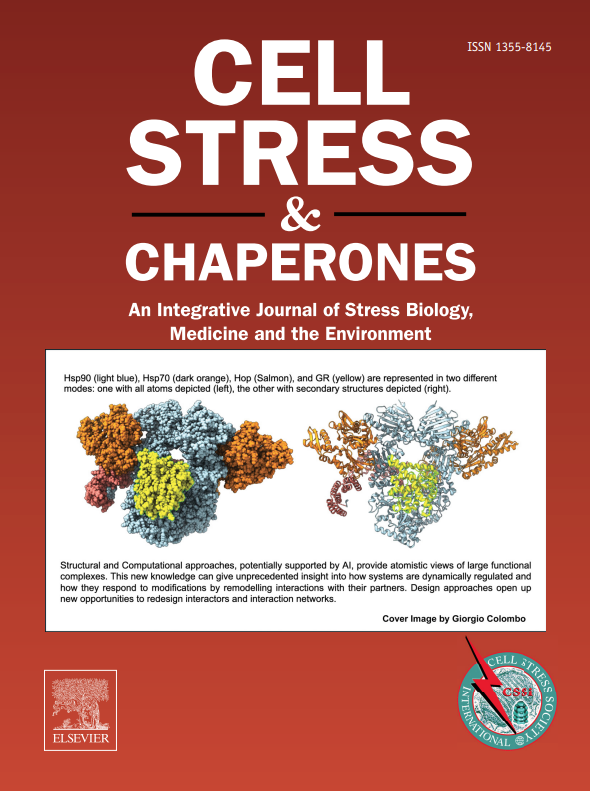派罗替尼通过引发依赖HSP90的HER2降解和依赖ROS/HSF-1的氧化性DNA损伤,诱导HER2阳性乳腺癌细胞死亡。
IF 3.2
3区 生物学
Q3 CELL BIOLOGY
引用次数: 0
摘要
HER2阳性乳腺癌(HER2+ BC)的特点是预后差、发病早、复发和转移风险高。因此,抗HER2靶向治疗已成为治疗这种乳腺癌的主要策略。派罗替尼是一种新型不可逆的泛HER2酪氨酸激酶抑制剂,为晚期HER2+乳腺癌患者带来了新的希望。在这项研究中,我们对派罗替尼的抗肿瘤机制进行了全面探索。体外实验结果表明,吡罗替尼通过促进HER2的内吞和泛素化,使HSP90从HER2上移位,导致HER2降解,从而显著抑制SKBR3细胞的活力并诱导其凋亡。除了靶向HER2信号通路外,吡罗替尼还能诱导DNA损伤,而DNA损伤是通过激活ROS/HSF-1信号通路和下调PCNA表达介导的。此外,体内研究结果表明,在SKBR3异种移植小鼠模型中,在降低HER2表达的同时,吡罗替尼具有明显的抗癌作用。总之,我们的研究结果为吡罗替尼治疗HER2+ BC的机制提供了新的见解。本文章由计算机程序翻译,如有差异,请以英文原文为准。
Pyrotinib induces cell death in HER2-positive breast cancer via triggering HSP90-dependent HER2 degradation and ROS/HSF-1-dependent oxidative DNA damage
HER2-positive breast cancer (HER2+ BC) is distinguished by its poor prognosis, propensity for early onset, and high risk of recurrence and metastasis. Consequently, anti-HER2-targeted therapy has emerged as a principal strategy in the treatment of this form of breast cancer. Pyrotinib, a novel irreversible pan-HER2 tyrosine kinase inhibitor, has brought fresh hope to patients with advanced HER2+ breast cancer. In this study, we conducted a comprehensive exploration of pyrotinib’s antitumor mechanism. The in vitro results showed that pyrotinib significantly inhibited SKBR3 cells viability and induced apoptosis by promoting HER2 endocytosis and ubiquitylation, leading to HER2 degradation through the displacement of HSP90 from HER2. Beyond targeting the HER2 signaling pathway, pyrotinib also induced DNA damage, which was mediated by the activation of the reactive oxygen species/heat shock factor 1 signaling pathway and the downregulation of proliferating cell nuclear antigen expression. Furthermore, the in vivo results demonstrated a pronounced anticancer effect of pyrotinib in the SKBR3 xenograft mouse model, concomitant with a reduction in HER2 expression. In summary, our findings provide novel insights into the mechanism of pyrotinib in the treatment of HER2+ BC.
求助全文
通过发布文献求助,成功后即可免费获取论文全文。
去求助
来源期刊

Cell Stress & Chaperones
生物-细胞生物学
CiteScore
7.60
自引率
2.60%
发文量
59
审稿时长
6-12 weeks
期刊介绍:
Cell Stress and Chaperones is an integrative journal that bridges the gap between laboratory model systems and natural populations. The journal captures the eclectic spirit of the cellular stress response field in a single, concentrated source of current information. Major emphasis is placed on the effects of climate change on individual species in the natural environment and their capacity to adapt. This emphasis expands our focus on stress biology and medicine by linking climate change effects to research on cellular stress responses of animals, micro-organisms and plants.
 求助内容:
求助内容: 应助结果提醒方式:
应助结果提醒方式:


